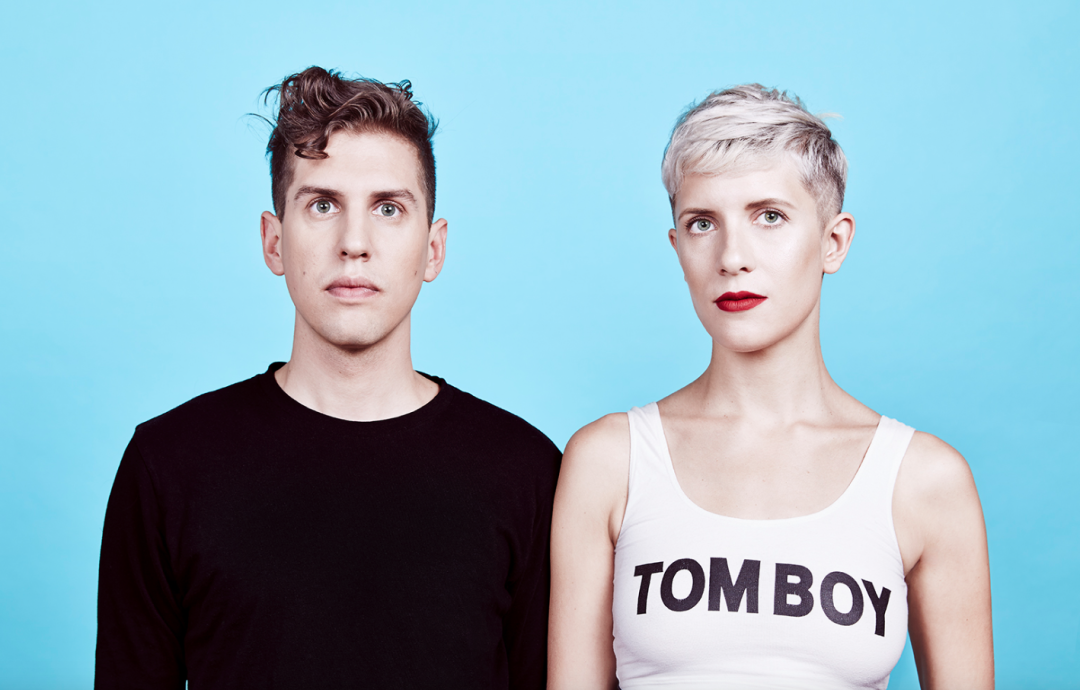YACHT’s Claire L. Evans on Coming Back to a Changed Portland

YACHT's Claire L. Evans (right) and Jona Bechtolt. Photo credit: Ricky Tompkins
What did you think the future was going to look like? That's the question former-Portlanders Jona Bechtolt and Claire L. Evans of the band YACHT will be dissecting this Saturday at the Wonder Ballroom. The duo has been making experimental electronic music that challenges ingrained norms for 13 years. I Thought the Future Would Be Cooler, their latest album, released Oct 16, pulls no punches in this regard. The future, after all, so rarely looks like what we imagined.
The album itself critiques various facets of modern culture, seeking to move beyond the petty claims typically attached to its titular lament. I Thought the Future Would Be Cooler isn't about unfulfilled promises of jetpacks or flying cars, but instead turns a critical gaze on everything from our collective fetishistic obsession with technology to systemically supported, widespread police violence.
The work itself is self-referential, as the band utilizes aspects of the technology, imagery, and widespread phenomena they seek to critique. How could they resist?
"We feel it’s pretty impossible to make a serious critique of the world we live in without using the tools of that very same world, both in album content and the way we like to promote and distribute it," says Evans.
Earlier this month the band released an app that would allow listeners to hear the second single off their upcoming album, but here's the catch: You could only hear the single when Uber had activated surge pricing—a practice that raises prices when demand for the service is at its most critical—in the Los Angeles area. Uber scales its surge pricing, so if the service increased its prices twofold, a remix of the song would unlock. The app itself was only active for roughly 48 hours.

Photo credit: YACHT
The project is reminiscent of the local scuffle between Uber and the City of Portland, when the transportation company opened shop without the city's blessing.
"I can’t believe the way they launched in Portland, it’s so insane," says Bechtolt. "And they’ve done the same thing in other cities—weirdly aggressive."
The focus on fleeting design and its baked-in obsolescence should come as no surprise, considering the band's fastidious concern with the ever increasing devaluation of music. We live in a time when an album is at its most precious prior to release. It's a problem that has been encroaching on the whole of art for years.
"We’re very interested in the larger conversation around art and the production and dissemination of art," says Evans. "I think that no matter how hard you work on something—we worked on this record for four years—we know the minute that it comes out it’s going to enter this undifferentiated stream of constant content that the world is constantly spewing at us all."
While this obsolescence culture is deeply problematic to the duo, it's a precipice that also appeals to them. It's why they moved to Los Angeles, a city they believe has an expiration date. It's that constant reminder of mortality—the beauty in decay—that catalyzes them.
Though modern technology is on the chopping block in I Thought the Future Would Be Cooler, the album is not meant to be a wholesale dismissal of technology. Evans, who co-edits the online science fiction magazine, Terraform, is quick to remind that technology as a concept is inseparable from humanity. Writing is a form of technology, as is language. There is no fundamental negative associated with the concept, only what we apply.
"I think that we tend to have—in this particular moment that we are in history—the sort of micro-view of technology as being our phones," says Evans, "and all the little pixels on our phone are sucking us in and making us antisocial, and making us stupid, and making us into shut-ins. That’s such a small piece of a much larger force that has guided us from the dawn of human history, and will continue to do so."
Using the literary branches of technology can help to bring to light modern issues such as climate change. Evans, who regularly writes and edits short form fiction, has been championing the book Gold Fame Citrus, set after the water wars in California. The book, and others likes it, are part of a growing genre within science fiction called cli-fi, which seeks to explore a time beyond plentiful resources, when global warming has altered the face of both humanity and the world itself.
For Evans, science fiction isn’t the isolated niche it is purported to be. She regularly commissions writers from outside the science fiction community—with backgrounds in journalism and nonfiction—to write about the future of their respective beats. A music journalist might write about the future of music. A food writer might tackle the end of food. And an environmental writer might break down what the world could look like in 150, or even 200, years.
That curiosity about widespread change is at the core of what makes YACHT, but it's also something they've considered locally. The two visited Portland just a few months ago for a friend's wedding. The changes, they recall, were staggering.
"Jona and I used to live on Mississippi four years ago, and we literally could not recognize our old street," says Evans. "There were buildings that I just didn't remember. I mean, the whole city is just so chameleonic. It's insane."
There's not a soul who can argue against that. Welcome back, YACHT.
YACHT plays the Wonder Ballroom on Saturday, October 24




